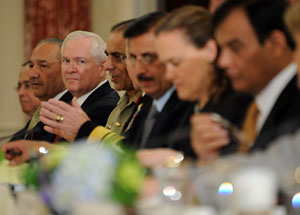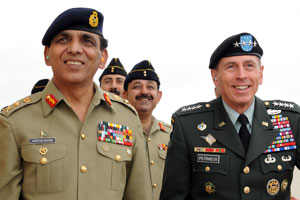Win Some, Lose Some
By Ayesha Siddiqa | News & Politics | Published 14 years ago
Pakistan and the US concluded their first round of talks under the auspices of the US-Pakistan Strategic Dialogue in Washington last month. Pakistan’s team comprised Foreign Minister Shah Mehmood Qureshi, various civilian bureaucrats and Army Chief Ashfaq Parvez Kayani, with his DG ISI in tow. According to the official version, the trip was “highly successful” and heralds a new chapter in the history of bilateral relations between the two states — a claim contested by political opponents.
Prior to the arrival of the delegation on Capitol Hill, Pakistan had sent a 56-page wish list spelling out its security concerns and economic needs. Islamabad wanted a whole range of equipment from Washington, including F-16s, attack helicopters, naval equipment, drone technology, airborne early-warning aircraft, missiles, tanks and several other items. In short, the military’s wish list included all the equipment required for creating a third strike corps. This, the GHQ believes, is essential to maintain its strategic balance against India. Additionally, there are several unpaid bills for the costs incurred by Pakistan in the war on terror and the army wants the US to fast track the disbursement of the coalition support fund.
The civil side, on the other hand, spoke about aid and cooperation in trade, agriculture, health, education and many other issues pertaining to capacity-building and social development. Pakistan has had to cut down its public sector development programme by nearly Rs 150 billion due to shortage of funds. However, the most significant demand on the Pakistan wish-list was a civilian nuclear energy deal to meet its growing energy needs, along the lines of the one agreed upon recently between India and the US.
Did the delegation take anything substantial home?
In her op-ed column for The News, Pakistan’s former ambassador to the US Maleeha Lodhi wrote: “The really substantive — and strategic — exchanges took place outside the formal dialogue process in unpublicised meetings. They included a dinner hosted by the chairman of the joint staff, Admiral Mike Mullen, attended by General Kayani, as well as the unannounced meeting between the top members of the Pakistani delegation and Vice-President Joseph Biden.”

Photo: AFP
The dialogue must be viewed as a process rather than a one-off event. It indicates the willingness of both states to put on the table their respective cards pertaining to what they expect of each other in a relationship which has seen many ups and downs, and suffers from a trust deficit. Alongside, it appears that the US is keen to review its links with Islamabad from the standpoint of giving a long-time ally confidence about the relative longevity of the relationship. The widely criticised Kerry-Lugar Bill was the beginning of that process in Washington; it aimed at committing US resources to Pakistan and communicating its intent for a longer-term linkage. This does not necessarily mean that the US will be willing to give major concessions to Pakistan overnight. For instance, on the issue of the civilian nuclear energy deal it has not said no, but given Pakistan’s history of nuclear proliferation to Iran, Libya and North Korea, the deal may be far away, unless Pakistan is willing to tailor its existing military options, according to American demands. This includes severing its relationship with the Taliban and the jihadis and keeping strict control of its nuclear technology. For the moment, the US has released $125 million for energy development. Such a deal would require a longer-term dialogue rather than a couple of meetings. Also, it could face severe opposition from the Democrats who are ideologically opposed to it, and were not in favour of the US-India deal either. It is not likely that they would allow such a deal with Pakistan to go through, at least not in the near future. However, the strategic dialogue could serve to keep the issue alive.
The highlight of the visit was said to be General Kayani’s PowerPoint presentation, which he made at several places. The Americans seemed impressed with the presentation — and the fact that he operated the slides himself. The crowd did not ask him too many difficult questions. In fact, the reception the army chief received this time was fundamentally different from the one he received when he came here last year. Then, many on Capitol Hill were angry about Pakistan’s suspected involvement in the bombing of the Indian embassy in Kabul. This time around, he had much to offer, including the two military operations in Swat and South Waziristan. Officials at the Pakistan embassy in Washington believe that Pakistan has turned the corner in terms of finally convincing the US to deal with them, rather than with India, on the issue of Afghanistan. In any case, there appears to be greater bonhomie between the Pentagon and the GHQ. Both Admiral Mike Mullen and General David Petraeus are impressed with General Kayani and believe that Pakistan’s armed forces have taken a U-turn as far as fighting terrorism is concerned. Consequently, the queries were relatively less tough, except at the armed services committee meeting where there were some probing questions to which the Pakistani general responded in his usual nonchalant manner — but he did hold out some verbal assurances.

Photo: AFP
On another note, the trip was indicative of the apparent shift in civil-military relations in Pakistan. The army chief seemed to be in charge, with the foreign minister being strategically kept away from the secret parleys at the Pentagon and left to field political questions. It was not surprising then to see Pakistan’s Ambassador to the US, Hussain Haqqani, seemingly changing sides, swinging from Asif Zardari to General Kayani. The army chief, who, otherwise, presents a cold demeanour, was seen warming up to Haqqani, which could be an indicator of the fact that the ambassador has managed to save his job. After all, Haqqani, with his tremendous insights into life on Capitol Hill and his amazing contacts, is a valuable asset.
At the end of the day, the writing on the wall was clear: the army chief is in charge of strategic matters and Asif Zardari will now be left to donating his body parts.
The writer is an independent social scientist and author of Military Inc. She tweets @iamthedrifter


